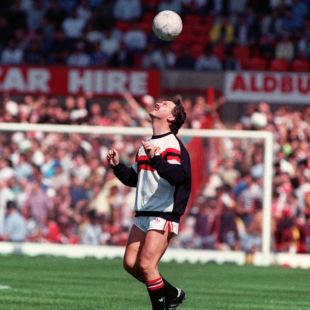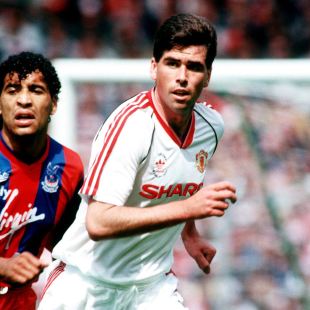- Rewind to 1989
Knighton's doomed United reign begins

Long before the days of Glazer rule at Old Trafford and the mysterious Red Knights, another in the United realm had attempted to take control of the club in 1989. English businessman Michael Knighton had a £20 million offer accepted and, on August 18, appeared on the pitch in full kit ahead of the 1989-90 season opener to revel in the moment of his career. However, it did not end as he would have liked.
With Liverpool ruling the roost in the English First Division in the 1980s, Manchester United owner Martin Edwards was making moves to sell the controlling stake that he had inherited from his father, Louis, at the start of the decade.
Media mogul Robert Maxwell had come close to agreeing a £10 million deal for the club in 1984, as Edwards sought distance from the spotlight and the chants of ''Edwards out'' from the stands. But the fee was not enough to tempt Edwards into ending 25 years of family ties with the club and, despite his increasing unpopularity among the United supporters, he continued his search for new investment.
A BBC report at the time shed some light on the reasons for Edwards' poor public profile, citing his ''large annual salary'' (that was around £30,000 a year) and his sacking of Dave Sexton and Ron Atkinson that ''alienated many fans''. His preference for the game of rugby also didn't endear him to many, while United's standing in the game had dropped to such an extent that attendances were falling and the legacy left by the 'Busby Babes' and legends like Bobby Charlton and George Best seemed a long way away.
But with cash needed to reinforce the playing squad, as well as the need to improve the famous Old Trafford ground, Knighton's arrival on the scene appeared a godsend for Edwards. Supported by business associates Robert Thornton, the former Debenham's chief executive, and Stanley Cohen of Parker Pens, Knighton pledged £10 million on top of the £20 million offer for the club itself to redevelop the stadium and help to launch them out of the doldrums.
In an age still dominated by hooliganism, Heysel and Hillsbrough, global marketing concerns were beginning to gather pace and Knighton's blueprint for success was impressive. Ensuring that the United brand would generate huge income streams from overseas, his focus on United's history and tradition stood him in good stead and his offer was accepted.
He announced on his arrival: "Manchester United is a legend. It is undoubtedly in my view the greatest football club in the world. I consider myself to be a football enthusiast first and a businessman second."
While holding down a regular job as a teacher, Knighton had made millions buying and renovating houses during the 80s property boom, but he got off to an inauspicious start in his new domain when he decided to make the Old Trafford pitch his own before the opening match of the 1989-90 season against Arsenal, the current league champions.
Dressed in full United kit, Knighton - who had once played for Everton and Coventry as a youth and was described by a caption in the Daily Express as 'a failed football player' - juggled the ball in front of the fans before slamming it into a empty net. The spectacle was certainly more successful than others from history [Diana Ross at USA '94 springs immediately to mind] but it did not go down well with those that mattered.
Sir Alex Ferguson had arrived in 1986 to begin his quest towards greatness, but said of Knighton's efforts: "I was starting to have a terrible gut feeling about my new chairman." United midfielder Clayton Blackmore, who was part of the squad that day, revealed: "My memories of him were him coming into the dressing room with a blazer on and his hand tucked into the inside pocket like Napoleon. I didn't know him, so I didn't want to make a snap judgement, but going out on the pitch like that wasn't the cleverest thing to do. It was as if it was all about him, rather than the team. It's like he thought he was the most important thing at United.''

The match, a 4-1 win for United, was a triumph; Knighton's pre-match parade was not. The headlines that should have gone to United's new hero Neil Webb, who had arrived from Nottingham Forest for £1.5 million that summer, instead read: 'Don't Juggle with United Mister Chairman' [Daily Express] and, although the paper's John Giles wrote of Knighton's ''innocent charm'', James Lawton warned he may have ''self-glorification on his mind''.
And Webb could not believe his eyes either. "We had heard about the takeover, but this chap came into the dressing room before the game, introduced himself as the new owner and then asked for a kit!'' he recalled. "We thought he just wanted to join in with the warm-up, but I couldn't believe what I was seeing when he ran on to the pitch and whacked the ball into the net at the Stretford End. It was hilarious, really. Unbelievable. He just decided that he wanted to go out there and have his own little cameo role. It was the kind of thing that football chairmen just don't do and we all wondered what was going on.''
But the situation would get worse, as Knighton failed to come up with the cash. Headlines of 'How can he buy without money?' and legal action from a worried Edwards, who was looking to get out of the deal, added to the adverse publicity surrounding the deal and eventually sunk it. Knighton's financial backers backed out and he was left high and dry. Unable to raise the funds needed to complete the takeover, he agreed to take a seat on the United board and 30,000 shares in order to withdraw his bid; although stated that it had ''cost me a lot of money.''
Knighton's predictions for the growth of the game, and Manchester United in particular, ulitmately proved correct when the club's value more than doubled when it was floated on the stock exchange for £47 million in 1991. Just over 14 years later, the Glazer family bought United for £790 million and made it the world's first billion pound football club shortly after.
But, despite becoming the subject of ridicule for his bold attempts to make the Theatre of Dreams his own, Knighton has admitted that he has no regrets, maintaining: "I don't regret it [going onto the pitch]. It made everybody happy and, for 64 hours or so, I was a hero."
Perhaps that statement sums up his failure best of all. United's heroes are, and always will be, on the pitch for their own merit.
What happened next? Knighton resigned from the Old Trafford board in 1992 and United would begin their domination of the new Premiership. He went on to take over Carlisle United but was not a popular figure and made the situation worse when he claimed to have seen a UFO in 1996. The Carlisle News and Star broke the story with the fantastic headline 'Knighton: Aliens Spoke To Me' and, even though he made himself manager the following year, he could not gain any kind of credibility and the club went into administration before he was finally bought out in 2002.

